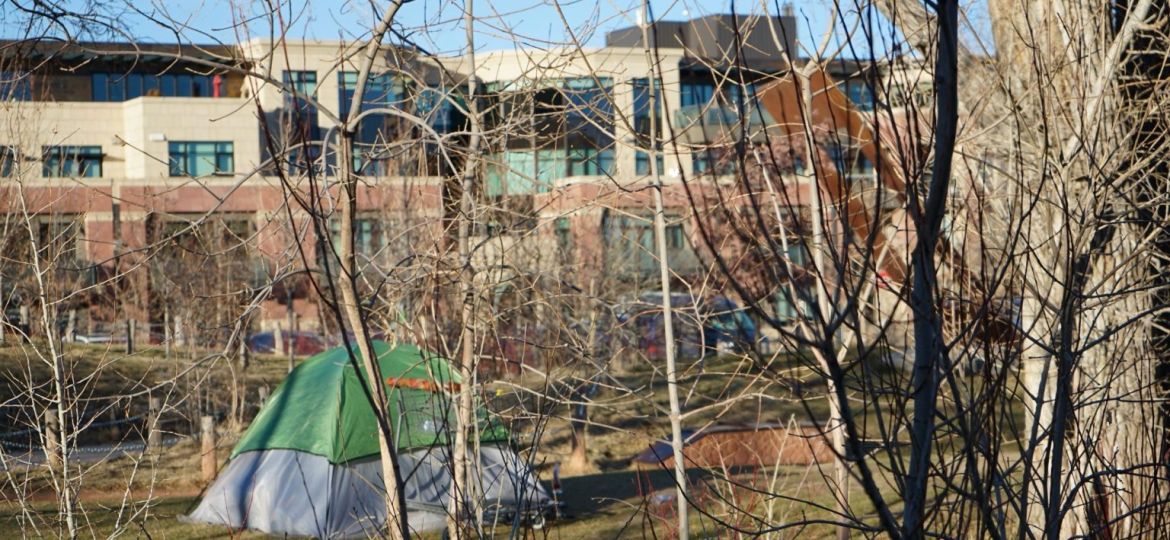
Homelessness Day Services Center Proposes Solution After Blanket Ban
Boulder is starting to refurbish public image from its blanket ban with the upcoming release of a new project: Homelessness Day Services Center.
The Colorado Department of Local Affairs received $1.3 million for the Homelessness Day Services Center and related services for Boulder’s unhoused population in early 2023. The center is projected to be fully operating later this winter to serve unhoused individuals 24 hours, seven days a week.
“The size and scope of services will be new for Boulder,” said Megan Newton, Homelessness Policy Advisor.
Individualized outreach for unhoused individuals to escape homelessness from the center is touted by the City of Boulder. The center plans to concretize a path of permanent housing and foster a multiplicity of services in a single location for unhoused individuals. But, is this too far-fetched?
Feet Forward, a non-profit organization, is acquainted with the plight houseless residents face, even what may go unnoticed. This is evident in their lawsuit (led by the ACLU) against the City of Boulder in May 2022, about the blanket ban, which urged that the unhoused population would risk death and losing fingers without a source of warmth. The court found the ban in violation of Colorado Constitution and will have a five-day trial for the case in August 2024. But Robert Gunning, the Boulder District Judge, dismissed the majority of requests for relief.
Feet Forward is also predicated on former unhoused individuals, with the CEO — Jennifer Livovich’s — experience with homelessness from 2012 to 2017. However, their expertise is constrained by their status as volunteers, who convene for only an hour each Tuesday.
“A staggering number of unhoused people are funneled to the law enforcement and legal system through policies like the blanket ban, rather than directed to the resources available that would help them to re-enter housing,” said Elizabeth Ogletree, the program’s director.
According to the Sturm College of Law, since 2010 Boulder has consistently exhibited a pattern of issuing more camping ban citations than any other city in Colorado, making it a significant outlier. Therefore, ordinances on the unhoused population impact Boulder the most, in spite of its smaller unhoused population.
“I think it’s a fantastic initiative, given that a place for the unhoused to spend daytime hours in safety from law enforcement, harassment, and so on has long been lacking from our community,” Ogletree said, in light of the day center’s upcoming release.
However, like all initiatives, the center has its pitfalls. The distance from encampments and the downtown area where unhoused people congregate to the center is counterproductive: the center’s location is all the way in North Boulder.
While the Boulder Shelter for the Homeless (BSH) intends to curtail the issue by working with RTD on bus passes, it is too long of a distance to walk in the case that an individual can’t make that bus; it’s roughly three miles from other encampments.
It also took a respite of nearly two years for the center to get up and running. There were a breadth of steps to get to this point, from determining what the center’s amenities will be based on through the Community Outreach Report, finding a suitable location, and hosting a “good neighbor meeting” (a meeting for neighbors of the day center).
In the “good neighbor meeting,” “The majority of the concerns were around impacts on and the safety of the neighborhood. Most concerns were not specifically centered around the shelter’s property and services provided at the Day Services Center,” according to Newton.
The public’s priorities doesn’t seem all too unforeseen when it comes to Ogletree’s account of the public.
“I think the public perception of the unhoused community is, unfortunately, a very big factor in limiting the success of many city projects, measures, and policies,” she said.
However, public perception does not absolve the city’s responsibility towards the unhoused population. For instance, programs inaugurated during the COVID-19 pandemic on federal stimulus money are in peril of no longer operating due to lack of funding.
On the basis of the day center, after the “good neighbor meeting” is the final step, the current stage the BSH is in until opening (the “implement” phase). In this phase, the BSH plans to get approval from the City’s Planning and Development Services for the shelter’s expansion and to hire and train staff.
“There is no specific opening date at this time. We are shooting for the end of March,” Newton said, when asked about when the city can anticipate the center’s opening.
Until the “implement” step is completed, the unhoused population will still contend with the blanket ban and the brunt of this winter without sufficient alms and shelter.


Thank you for the In-depth understanding effecting homelessness. Along with the red tape that is place that can slow down progress!
Great article.
Loved this article! Very informative. Hope there is a follow up to inform about the distance solution.
Very helpful understanding what’s going on.